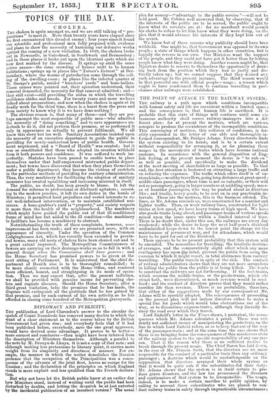TOPICS OF THE DAY.
THE cholera is again amongst us, and we are still talking of" pre- parations" to meet it. More than twenty years have elapsed since we first encountered this dreaded enemy ; four years since it found our scientific and professional men fully prepared with evidence and plans to show the necessity of hastening our defensive works against the coming of a new visitation. In 1849, the cholera broke out in Newcastle, in Gateshead, in Southwark and Bermondsey ; and in those places it broke out upon the identical spots which are now first marked by the disease. It springs up amid the same active causes—the same crowding of houses unfit to be human habitations • springs up in places like "Turner's Retreat" at Ber- mondsey, where the worms of putrefaction come through the ceil- ing of the dwelling-room ; in places like the infected quarter of St. George's parish, amidst "knackers' yards" and bone-boilers. Those causes were pointed out, their operation understood, their removal demanded, the necessity for that removal admitted ; and— they still exist—still providing the nidus in which the travelling pestilence abides and breeds. For twenty years and more we have talked about preparations, and now when the cholera is again at its deadly work for the third time, there is a burst from the press and from society to know why it is we have done nothing ? The obvious reason is, that many of those—and they are per- haps amongst the most responsible of public men—who admitted the necessity of "doing something," and to save appearances un- dertook to do it, did not perform their promise, or so performed it only in appearance as actually, to prevent fulfilment. We all know this story but too well. Sanitary Associations insisted upon the necessity of an executive department to guide the public in providing for newly-understood laws of public health. Govern- ment acquiesced, and a "Board of Health" was created; but it was so constituted that those who adopted its creation withheld from it both powers and confidence. It was suffered to work im- perfectly. Statutes have been passed to enable towns to place themselves under that half-empowered mistrusted public depart- ment; but towns have discovered that when they place themselves under a public department, they become the victims of crotchets in the particular methods of providing for sanitary administration. Thus, the very machinery for facilitating the adoption of sanitary measures has created squabbling and increasing mistrust in itself.
The public, no doubt, has been grossly to blame. It left the demand for reforms to professional or dilettanti agitators; accord- ing to the modern practice, it left its own duties in the hands of Ministers ; it permitted local prejudices and vested interests to re- sist well-informed intervention, or to maintain established nui- sances. A bone-grubber's yard is "property," and society respects it more than the health of the neighbourhood. The machinery which might have guided the public out of that ill-conditioned frame of mind has but added to the ill condition—the machinery to facilitate has become a machinery to obstruct. Notwithstanding the truth of these complaints, however, some improvement has been made ; and we are promised more, with an appearance of sincerity. Under the operation of the Common Lodginghouses Act, which has recently been extended to provin- cial towns, many old nests of cholera have been cleared out and to a great extent improved. The Metropolitan Commissioners of Sewers are carrying on their drainage-works so as to fall in with a general design when the Commission shall have powers ; and the Home Secretary has promised powers to be given at the next sitting of Parliament. It is understood that the chief de- partment of Health also is to be thoroughly remodelled ; to be more closely connected with the Home Office, and rendered more efficient, 'honest, and straightgoing in its mode of opera- tion. Thus we may expect that, after the present infliction, we shall be provided with genuine means for preventing cho- lera and cognate diseases. Should the Home Secretary, after a third great visitation, belie the promises that he has made, the disgrace will extinguish all the gratitude that he has gained by that promise, and by such earnest of his own activity.as he has afforded in closing some hundred of the Metropolitan graveyards.


























 Previous page
Previous page